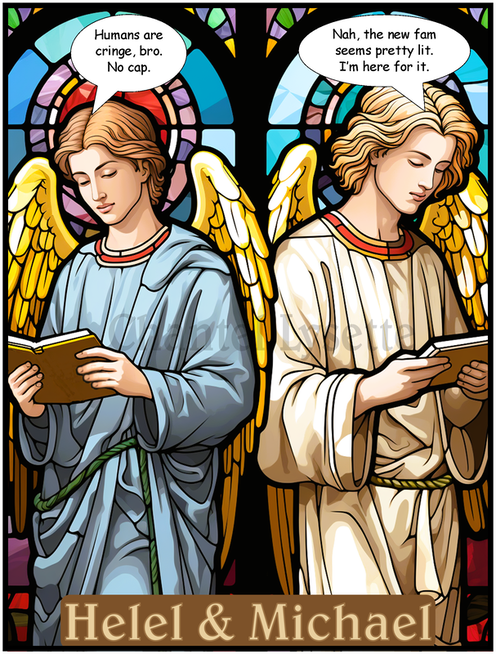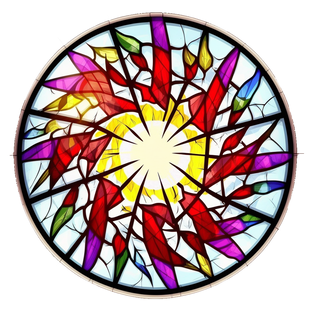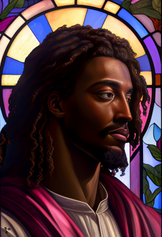 Helel and Michael's "war" was more of a heated discussion. Considering that archangels weren't equipped with emotions, "heated" was a pretty big deal, so it makes sense that humans would blow the whole creation story out of proportion. --"Twins Michael and Helel" (c) 2023 C. Lysette & R. G. Breus Helel and Michael's "war" was more of a heated discussion. Considering that archangels weren't equipped with emotions, "heated" was a pretty big deal, so it makes sense that humans would blow the whole creation story out of proportion. --"Twins Michael and Helel" (c) 2023 C. Lysette & R. G. Breus In The Beginning According to Judeo-Christian mythology, Lucifer fell to Earth after being defeated by Archangel Michael. The naughty angel, said to be consumed by pride and desire for the divine throne, landed on a blackberry bush. He cursed it, spat on it, stomped it with his hooves, and then urinated on it to show his utter disdain for the prickly bramble. In all, that fateful October 11th was a no good, very bad day for who would become God's archnemesis and humanity's fall guy for all eternity. Early Christians loved this story so much, they decided to deem Lucifer's eviction from Heaven a holy day. To add salt to the fallen angel's wounds, the Christians named this holy day of October 11 “Michael’s Mass.” But when the first European countries made the switch from the Julian to the Gregorian calendar in 1582, Michael’s Mass--now "Michaelmas"--was moved up from October 11 to September 29, and European Christians still celebrate it to this day. Dancing On The Head Of A Pin But if you give just one angel his holy day, all the other angels are gonna start huffing and complaining. Thunder starts rumbling, lightning starts streaking, a village goes up in flames, and then nobody’s happy. Gabriel and Raphael were lucky enough, as they had stellar public relations with the humans. The two angels would be awarded their own feast days in the spring and autumn, respectively. Alongside Michael, that's only three angels, though, and we all know there’s a hell of a lot more angels than that, pardon my language.
0 Comments
 "Thorns" by 7RB (c) 2023 Atlantean Glow "Thorns" by 7RB (c) 2023 Atlantean Glow Long ago, a brave and selfless act by the youngest archangel in Heaven cemented humanity's place in Paradise for all eternity. That angel’s name is Immanuel, and today, humans in Heaven hail him as king of the angelic body. Back when our dreamworlds were relatively new, archangels Helel and his twin brother Michael were locked in an eons-long bout of incessant bickering. When Helel, the eldest angel of Creation, had reached his wit’s end with humanity's antics, he demanded that the entire lot be cast from Paradise. Michael, who had come to dearly love the newest addition to Heaven, spoke up in protest. However, he was outmatched by his twin Helel, who was backed by archangels Cassiel and Uriel. No other angel wanted to get involved with this quarrel. The angelic body had witnessed discord among humans aplenty, but they'd never experienced it amongst themselves, so no one knew what to expect. At this point, Michael was alone in his fight to keep humanity in Heaven. That is, until Immanuel spoke up. Immanuel, the firstborn angel after the creation of light, stepped between the two elders, Helel and Michael. Almost immediately after humans first arrived, Helel had been arguing that humans were flawed creatures, unworthy of Paradise, to which Immanuel retorted, “Nothing imperfect can come from the perfection of the Creator.” Immanuel argued that if one saw humans as flawed, then one must also view the Creator as flawed. The young angel had stunned all of Heaven silent with that statement, as no angel would even dare think the Creator imperfect, much less speak those words aloud as Immanuel had. After a tense, philosophical debate with Helel, who had visibly bristled at Immanuel’s brazen words, Immanuel would offer himself up for an experiment. He offered to live a human life in order to experience and investigate what humans endured during their life journeys. Perhaps he could discover, then, why humans were the raucous, troublesome children they were. After all, Helel, Cassiel and Uriel were all standing in judgment of a creature they didn't fully understand. Humans were different, sure, but up to that point, not a single angel in Creation had dared to traverse one of the many human dreamworlds to see what drew the humans in like moths to a flame. Initially, Helel considered Immanuel's trek into the illusion a fool's errand but then decided to use the young angel's folly to his advantage. He then wagered that if Immanuel returned home "corrupted," as Helel felt many humans had, then humanity would be forever banished from Paradise. From Heaven. Immanuel then countered that if he returned from the dreamworld whole, then humans---baby siblings to the angels---would remain and Helel's argument against them would be laid to rest. Michael, witnessing this exchange, firmly protested Immanuel's journey into a human world, but the script had already been written. Michael and Helel had been fussing over humanity’s residence in Heaven for so long that Immanuel had already quietly sought the Creator's counsel. The eldest sons bickered as the whole of the angelic body watched in silence; Immanuel, however, seemed to be the only one who thought to go ask the Source itself how it felt about its human creation. By time Immanuel stepped into the fray between the twins, he already had a plan---a plan backed by the Creator. It was also a plan that did not include Michael. Michael, ever protective, was keenly watchful over baby Immanuel. No doubt, Michael would try to protect Immanuel in the dreamworld, especially after Immanuel had boldly invited Helel to "do [his] worst" to make Immanuel's human life, well...hell. The young angel wanted an authentic human experience without Michael trying to move literal worlds to make sure the experience was as cushioned and uneventful as possible. The emphasis here is on the word "try" for in actuality, despite being the most powerful angel in Heaven, Michael had little to no dominion over the dreamworlds without express permission from the Creator. This was true for all the angels in Heaven. While the angels---more accurately, Raphael---created the first dreamworlds to keep the humans busy and out of the angels' hair, the many worlds that would follow would be jointly created by the Creator and humans, leaving the angels to serve only as observers and guides. Once set in motion, however, all anyone outside the dreamworld could do is watch. No one, save the Creator, could alter a world or human script once it launched. Even then, the Creator had done that only once. Once in the whole of Creation’s existence. We’ll come back to this later. Immanuel wanted the entire human experience---all its resplendence and all its grotesquerie. He had written into his script great joy, as well as great anguish. He allowed his avatar to be as vulnerable as possible to all the hideousness of humanity, all to prove to his brother Helel that the human experience is an eternal journey of change, growth and spiritual evolution, and also to prove that no human was beyond redemption. No soul was "corrupted," as Helel had claimed. Instead, Immanuel felt that souls returning to Heaven in less-than-satisfactory condition were merely processing residual effects of a particularly burdensome script. In a short time, the humans would heal with a little warmth, charity and tender care---something the angels hadn't quite yet mastered because, unlike their human counterparts, they hadn't been born with emotion. Emotion. The angels weren't equipped with it. Weren't hardwired for it. Didn't have the capacity for it. Weren't interested in learning about it. “But if angels weren’t born with emotion, how is it that Helel and Michael’s fight came to be in the first place?” you might ask. This epic battle between the twins didn’t happen when humans first came off the metaphorical assembly line. Humans had been around for a few eons, causing trouble everywhere they went. By time the twins started going at each other, the whole of the angelic body had had plenty exposure to the brat-sibling that was humanity. Those working closest with humans, what we call archangels today, began to pick up a trait or two. It was so seamless and organic that the angels themselves hadn’t really noticed. Michael, who in the beginning was a stoic and callous “enforcer,” began to considerably warm and soften as he worked with humanity. On the other hand, Helel, who had been aloof and focused only on tending to the Garden---yes, that Garden---began to grow increasingly agitated, frustrated over the chaos and destruction that the humans had brought to Paradise. Still, there was Immanuel. He was much younger than the twins. Born alongside the arrival of humanity, he had no reference to the peace that existed before humans. Immanuel knew of the Void, and its dark and silent embrace, through the collective consciousness---also known as the Book of Life, the Akashic Records, or [the] Metatron. The child angel had read about this time before time, this time before Creation, but he had never experienced it. To Immanuel, the chaos humans brought to the Heavenly table seemed quite normal. To him, emotion wasn’t a defect, but a feature. But more than that was purpose. The Creator did nothing without purpose. Immanuel knew that this chaotic creature called a human had to have a place in Heaven since the Creator put it there. Apparently, Helel and Michael, going through some sort of emotional puberty, had briefly forgotten this huge detail. Thankfully, little Immanuel remembered. Needless to say, Immanuel won the wager between him and Helel because I'm able to type this and you're reading it. Upon his return, Immanuel reminded Helel that the Creator had charged the angels with not only watching over the humans but guiding the humans, as well. Helel would then choose to tend to "broken souls," souls that had overburdened themselves with difficult scripts and thus required extra care upon returning to Heaven. The elements of tender care---compassion, empathy, sympathy, to name a few---which all had largely been absent from the angels’ repertoire, then had become Helel’s sole focus. But only after the Creator first shut everything down. Immanuel’s return brought with it a tsunami of emotion that swept over Heaven. Angels who had never before felt much of anything found themselves overcome with the entire spectrum---joy, sorrow, grief, rage, shame, and everything in between. The angels closely involved with Immanuel’s script---Helel as Lucifer, Cassiel as Judas Iscariot, Uriel as Pontius Pilate---were utterly inconsolable. Cassiel confessed he searched for a place to hide in Heaven only to realize no such place existed. He wanted darkness, but being as everything in Heaven was made of light, not even a shadow could be found. Seeing the angels in this state of distress, the Creator brought Heaven to a screeching halt. Everything stopped. Everything. World scripts were abruptly ended, life scripts terminated regardless of whether they were completed. Essentially, the Creator forced a server-wide shutdown and brought everyone home. The dreamworlds were now offline, much to the dismay of many humans. The angels, who were as equally confused by the abrupt and sudden measure, were then told, “Go create.” The entire angelic body stood silently in the presence of the Creator, dumbfounded by a divine decree for the very first time. They didn’t understand the command. “Go create.” What did that even mean? Cassiel didn’t hesitate and withdrew from the angelic assembly in the blink of an eye. He interpreted this strange command as the Creator granting them carte blanche to create worlds akin to Heaven, something only the Creator did up to that point. While the other angels stood still and silent, contemplating what "go create" would even entail, Cassiel’s first and immediate act was to return darkness, if only a small pocket of it, to Heaven. Within it, he hid himself. The then Angel of Kings refused to reemerge from his cave, that is, until Immanuel visited him to remind him, “It was just a dream, brother. Just a dream. I’m all right, and so are you.” Reluctantly, Cassiel returned to the angelic body, but no longer as the Angel of Kings. Instead, as the Angel of Sorrow. Many archangels would create their mansions while the human dreamworlds were offline. Michael would create a sun-drenched desert---an endless sea of golden sand bedecked with towering structures that inspired the Egyptian pyramids, all encircling a lush rainforest biome. Uriel, in contrast, would create a boundless volcanic field intricately laced with black and crimson beaches, lava flows and quickened by undulating tectonic activity. Cassiel's mansion would be cloaked in perpetual night with only a faint moon and even fainter stars as skylights. It is a dark, foreboding valley locked in the chill and barrenness of late autumn and flanked by shadowed mountains whereupon his friends, the serpent cloud dragons, dwell. Helel, in his rage over losing the wager, had razed the Garden to ashes---its splendor reduced to a desolate, gray desert. A wasteland, by many human accounts. Immediately afterward, however, the angel felt immense shame for his actions, but chose not to restore it after the Creator gave the order to "go create." It is here where Helel now tends to the souls in need of extra care upon returning home. As his older brothers tinkered and then retreated for a time into their mansions, Immanuel remained among the humans, who were itching to get back into their dreamworlds. He made himself present, visible and available to anyone in need. A stark reversal from the cold, commanding presence the angels once had before. The humans had been acutely aware of Hele's campaign to oust them but felt voiceless and powerless to do anything about it. Now, here the youngest of angels were among them, not as an enforcer, not as a warden of some kind, but as a friend. More than that, as their champion! This is how humans came to call him the King of Angels. (Though today, Immanuel is still ambivalent about such a title.) Immanuel, who had been born in the same instance as humanity's arrival, understood humans and how to best communicate with them far better than his older brethren. And since Immanuel had lived a human life, he had developed a much deeper love and appreciation alongside that understanding. He would then sit with humans to explain what had transpired between the angels and then propose to humanity that perhaps their chaos should be kept contained within the dreamworlds. Heaven, he offered, should be a place of peace and respite. The humans, grateful for his sacrifice, would agree. Then again, they didn’t have much of a choice, for now Helel had a place to put the troublemakers if they wanted to bring the dreamworld drama home. Not much is forbidden, as it were, but tracking in the mud from playing outside all day is definitely a big no-no. To remember this, we humans bring Heaven with us into the dreamworlds, if it’s not already written into the world script. We carry the archangels and their story with us. Immanuel’s human avatar, whom we call "Jesus" in our world, was created eons ago. Not a mere two millennia. “Lucifer,” “Judas,” “Pilate” are placeholder names. Names this world on this time line has attributed to avatars lived long before this world was even created. We create evil, demonic characters to remind us that we cannot take our quarrels home with us. Instead, we must leave them behind in the dream. Likewise, we create benevolent, savior characters to remind us of what Immanuel---one of his many countless names---did for us as a whole, not just “on Earth.” To this day, the angels can only offer their guidance and influence on the human dreamworlds, but thanks to Immanuel, they are all required to visit from time to time. Born as humans, the angels lose all their knowledge and power, for a spell. In essence, they are just as human as you and I, but their scripts are set to what gamers these days call "insane, "extreme," or "hardcore" mode. That's to say, the archangels live through horrific lives and are often the harbingers of significant world change. They play the big bosses at the end of the game that we humans must come together to rally for or against, characters that are tethered to the world script, characters (avatars) that the Creator already had set in place to affect a sweeping, and often jarring, transformation---at least in the eyes of the humans witnessing it. As Archangel Michael often says, "Those rare moments we angels touch down on Earth never bode well for humans." At least, not in the immediacy. The angels play roles that alter the world's landscape, roles that are far too burdensome for humans to play. When they return home, they carry little to no baggage from the assignment, whereas humans often seek to bring their worries and wars back with them. To Helel's great relief, these difficult avatars are strictly reserved for the angels so as to keep the human traffic through his mansion-turned-rehabilitation-center to a minimum. After Helel and the other angels had completed their mansions and returned to their stations in Heaven, Immanuel then took his leave from humanity for a short time to create his own mansion. One of the last angelic mansions developed, it is a sprawling woodland and mountain range with winding rivers and effervescent streams. It's a modern-day outdoorsman paradise with the best fishing in all of Heaven, Immanuel’s favorite past-time. There, the young angel resides with the two Marys, as we call them today. But his work is far from done. Where Helel attends to burdened souls in Heaven after they've completed a script, Immanuel attends to burdened souls whilst they still dwell in the dreamworld. The King of Angels comes into our lives when we need to exercise self-care and self-kindness. As an angel of mercy, he teaches us to be merciful to ourselves, as well as others. As an angel of redemption, he reminds us that no human is outside the grace of the Creator. Though some of us may find it difficult to truly believe this in the face of all the horrors we witness, and thus find it beyond challenging to extend forgiveness in the face of the most egregious of offenses, Immanuel gently reminds us that such forgiveness is and should be available to all who sincerely seek it. He is the patron of charity and good will. He is the patron of counselors, ministers, Good Samaritans and immigrants, as well as philosophers, community leaders, and activists. He’s the energy behind “pay it forward.” When we find ourselves running low on patience and empathy in a world that is constantly testing our limits, Archangel Immanuel is a bottomless wellspring of love, compassion and understanding that we may all visit to replenish our storehouse of hope and faith in humanity.
|
AuthorChantel Lysette, International Author and Psychic Medium Archives
May 2024
Categories
All
|


 RSS Feed
RSS Feed

